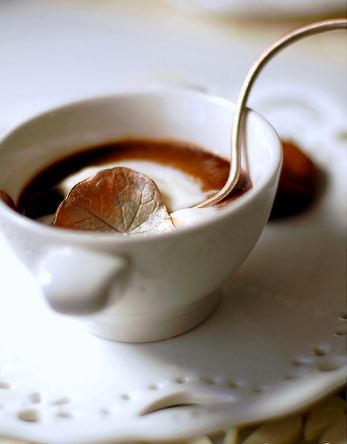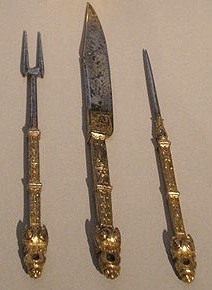More French Dining Etiquette for Foreign Guests in a French Home
- SUBSCRIBE
- ALREADY SUBSCRIBED?
BECOME A BONJOUR PARIS MEMBER
Gain full access to our collection of over 5,000 articles and bring the City of Light into your life. Just 60 USD per year.
Find out why you should become a member here.
Sign in
Fill in your credentials below.

Last week’s what to do and not to do when dining as a guest in a French home drew lots of responses. So welcome to Part Two with more tips and etiquette lessons.
It’s better for foreign travelers to know the unwritten rules and expectations of guests than to commit faux pas because you’re unaware of cultural differences coupled with subtle nuances.
My own faux pas
Before continuing, it’s only fair I confess the (OMG) crise I committed when I was younger. I knew how to use finger bowls and that you shouldn’t pick up and chug-a-lug the water complete with the thinly shaven lemon slice.
However, I had an embarrassing experience once at a very fancy dinner party when served what looked like a small cup with a lid, which I politely declined by saying I didn’t want an after-dinner coffee. The waiter explained what I’d nearly missed and I clearly lived to tell the anecdote.

Yes, I did indeed want that pot de crème au chocolat, a thicker-than-thick chocolate dessert with a tiny dollop of crème fraîche.
The next day I bought a dozen of these adorable demitasse cups with covers to use at our next dinner party so we could (at least try to) appear more French than the French. That was more than 20 years ago and perhaps it’s time to bring them down from the top kitchen cabinet to show them off again.
Fork in left hand and not just to cut food
Watch a French person eat and you’ll see the fork is held in the left hand the entire time, not just when cutting food. It seems strange to the French (and most Europeans) that an American dining will switch the fork from the left to right hand. If you can feed yourself gracefully using a fork with your left hand, do; if not, don’t.
 Keep your hands where we can see them
Keep your hands where we can see them
Why is it proper when dining in France to keep your hands visible or at least not in your lap?
French history and folklore offer two explanations: one version claims hands were kept out of laps so all would know that others seated at the table had no daggers poised to stab someone. Another version has something to do with same as touching wine glasses for fear of poisoning à la Catherine Médicis, who poisoned more than one victim with poison stashed in a ring. And there’s something about playing “footsie” under the table. I’ve also been told by French natives it has more to do with where those hands are and where they’ve been.
Some French don’t put their elbows on the table, others do; follow the lead of those you’re with.
Bread: tear, but don’t schmear
Tear a section of bread from a loaf, don’t slice it with a knife. And if butter is available (frequently not in a French home), please use your knife to spread butter on your bread, don’t swipe the bread against the butter to spread it.
Salad: give your knife a rest
If you’re served a salad, do not cut the leaves with the knife, it suggests your host did not properly prepare the salad. Use your fork (in your left hand, if you can) to fold the leaves into a small, bite-size portion. It’s an acquired talent, but do make the effort if you want to appear “correct.”
Finger food
Feel free to eat asparagus with your hands. There are numerous stories with sexual innuendos—but I won’t go there, use your imagination.
Soup rules
Soupspoons are used when there’s soup, and always tip the shallow soup bowl away from you when you’re finishing it. If you’re presented with a bowl that looks like a cup with handles, you may pick it up and drink the last remains and not be considered a boor.
Wine glorious wine
No matter how thirsty you may be, do not reach over and pour your own wine—wait for your host or hostess or another delegate to refill your glass. It’s commonly said that the French are very good at drinking in moderation during long dinners; in other words, don’t overindulge if you’re attending a “proper” French dinner party. If you’re offered an apéritif before dinner, opt for champagne or white wine. If you drop a glass of red wine, you’ll end up on your hands and knees cleaning it up and apologizing.
Some Don’ts
Don’t ask your dinner partner what he or she does for a living. They’ll tell you sooner or later and if you’re French or understand the “social codes,” you’ll know when conversation turns to discussing the grandes écoles, the most prestigious schools in France.
Don’t ask questions about income or salary—that’s considered ruder than rude.
Don’t say you don’t like a particular food served to you. If you’re a vegetarian or have certain dietary restrictions, notify your host before the dinner and offer to bow out if accommodating your needs is awkward for the hostess. For example, a rack of lamb might be the star on the table and others at the table might be uncomfortable if you don’t eat. If you find an unappealing item before you, don’t say a word, eat other items, push the unwanted food around your plate and pretend you’re full.
Don’t ask for a tour of the apartment. The French consider that an invasion of their personal space and whatever you do, never ask the cost of an apartment or home.
Don’t serve cheese before dinner, should you ever entertain French guests. Cheese is served after the main course with or without salad.
Dress code
Even if your host tells you to dress casually for an informal dinner in a French person’s home, don’t take them at their word and don’t arrive wearing anything less than you’d wear to a cocktail party unless you’re dining at a country home.
Safe dinner discussion topics
You’ll never go wrong asking your hosts and their guests about recent vacations, their next vacation and what they’re currently reading. Those subjects are safe.
Last words of advice
Take the hint about when it’s time to leave and do make a polite exit. If a tray of water and juice is passed, that’s a signal that it’s been a lovely evening.
I hope this demystifies the codes and practices at a French dinner party. And if you live in France, you need to know the rules so you may break them.
© Paris New Media, LLC
PHOTO CREDITS: Pot de crème au chocolat: L’atelier Vi; and Personal French traveling cutlery, circa 16th century: David Jackson-WikiCommons
Would you like to propose a story? Submit an article or story idea.
Subscribe for free and never miss a story. Search our library with 7,200+ stories and 50 original stories published monthly. BonjourParis has been a leading online France travel and French lifestyle site since 1995.
![]() Thank you for using our direct link to Amazon.com, everytime you shop the world’s largest online retailer.
Thank you for using our direct link to Amazon.com, everytime you shop the world’s largest online retailer.
View our Top 100 Bestselling Amazon.com Items. (Wait for Amazon.com widget to load)
Featured recommendations:
Stuff Parisians Like: Discovering the Quoi in the Je Ne Sais Quoi. July 2011. By Olivier Magny of O Château wine bar
A Year in the Merde.
All You Need To Be Impossibly French: A Witty Investigation into the Lives, Lusts and Little Secrets of French Women.
Cultural Misunderstandings: The French-American Experience
Eating and Drinking in Paris (5th edition): French Menu Translator & Restaurant Guide. August 2011.
Want more? View our recommended France-themed books & items. Most recent listings at last pages.

Discount code for Auto Europe car rentals:
Auto Europe is your best choice for car rentals in France and Europe. Most competitive rates, no drop fees.
Bookmark & use our link for a 5% code discount here: Auto Europe Car Rental
Don’t overlook Auto Europe for international flights, click Auto Europe Flights
More in dining etiquette, Dining in Paris, Eating in Paris, etiquette, food, Food Wine, French etiquette, French food, French wine, social etiquette, wine









